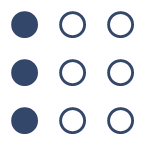Status
|
EXPERIMENTAL: This status indicates that this software is experimental code at best. There are known issues and missing functionality. The APIs are completely unstable and likely to change. Use in production systems is not recommended. All code starts at this level. For more information see the ROS-Industrial software status page. |
Contents
Overview
This repository is part of the ROS-Industrial program. This project has been developed by the Institut Maupertuis, a French research institute that is working on robotic industrial processes.
ROS Additive Manufacturing (RAM) provides a set of tools (mostly algorithms and GUIs) to help end users create complex trajectories for additive manufacturing. The project is especially focused on printing metallic parts with industrial robots. This project contains multiple tools: path planning algorithm able to generate complex trajectories, visualisation tools, editing tools, etc.
As of today this project aims at generating a robot program specific to the robot brand you use, and then upload/run the program on the robot. It's not designed to directly control your robot, though it would be possible quite easily.
Logo
![]()
Video demonstration
https://www.youtube.com/watch?v=6U0zRbDbjQs
User manual
A french user manual is available at https://institutmaupertuis.gitlab.io/ros_additive_manufacturing/
Dependencies
This package has been tested with Ubuntu 16.04 and ROS Kinetic.
Sphinx and LatexPDF
This is necessary to be able to generate the documentation.
sudo apt install -y python-pip latexmk texlive-base texlive-latex-recommended texlive-fonts-recommended texlive-latex-extra sudo pip install --no-cache-dir sphinx==1.7.4 sphinx_rtd_theme
VTK 7.1
You need VTK 7.1 or higher in order to compile this project.
Here are quick steps to download, compile and install VTK latest release:
sudo apt install -y libglew-dev libxt-dev libqt5x11extras5 mkdir -p $HOME/libraries/VTK-8.1/build_release cd $HOME/libraries/VTK-8.1/ wget http://www.vtk.org/files/release/8.1/VTK-8.1.0.zip unzip VTK-8.1.0.zip mv VTK-8.1.0 src cd build_release cmake ../src -DCMAKE_BUILD_TYPE=Release make -j4
Install with:
sudo make -j4 install sudo ldconfig
wstool
Install wstool.
rosdep
Install, initialize and update rosdep.
Compiling
Create a catkin workspace and clone the project:
mkdir -p catkin_workspace/src cd catkin_workspace/src git clone https://gitlab.com/InstitutMaupertuis/ros_additive_manufacturing.git cd .. wstool init src src/ros_additive_manufacturing/ros_additive_manufacturing.rosinstall
Resolve ROS dependencies
rosdep install --from-paths src --ignore-src --rosdistro kinetic -y
Compile
Use catkin_make to compile
catkin_make
Using the Qt GUI user application
Source the catkin workspace in which you compiled the package, then launch:
roslaunch ram_qt_guis gui.launch
There is desktop a file installed when installing the project: you can open the software like any other application using the application menu.
If you delete the installed files from your workspace the desktop launcher will not be deleted. It is located in $HOME/.local/share/applications; you need to remove this file manually.
Running the tests locally
The tests can be run locally with a GUI; for each package that allows that the commands are detailed in a README file; for example in ram_path_planning/README.md
Please check inside the repository if there is a README file in the package you are interested in testing!
How to contribute
- Write documentation
Open merge request to fix bugs, improve/add functionalities








